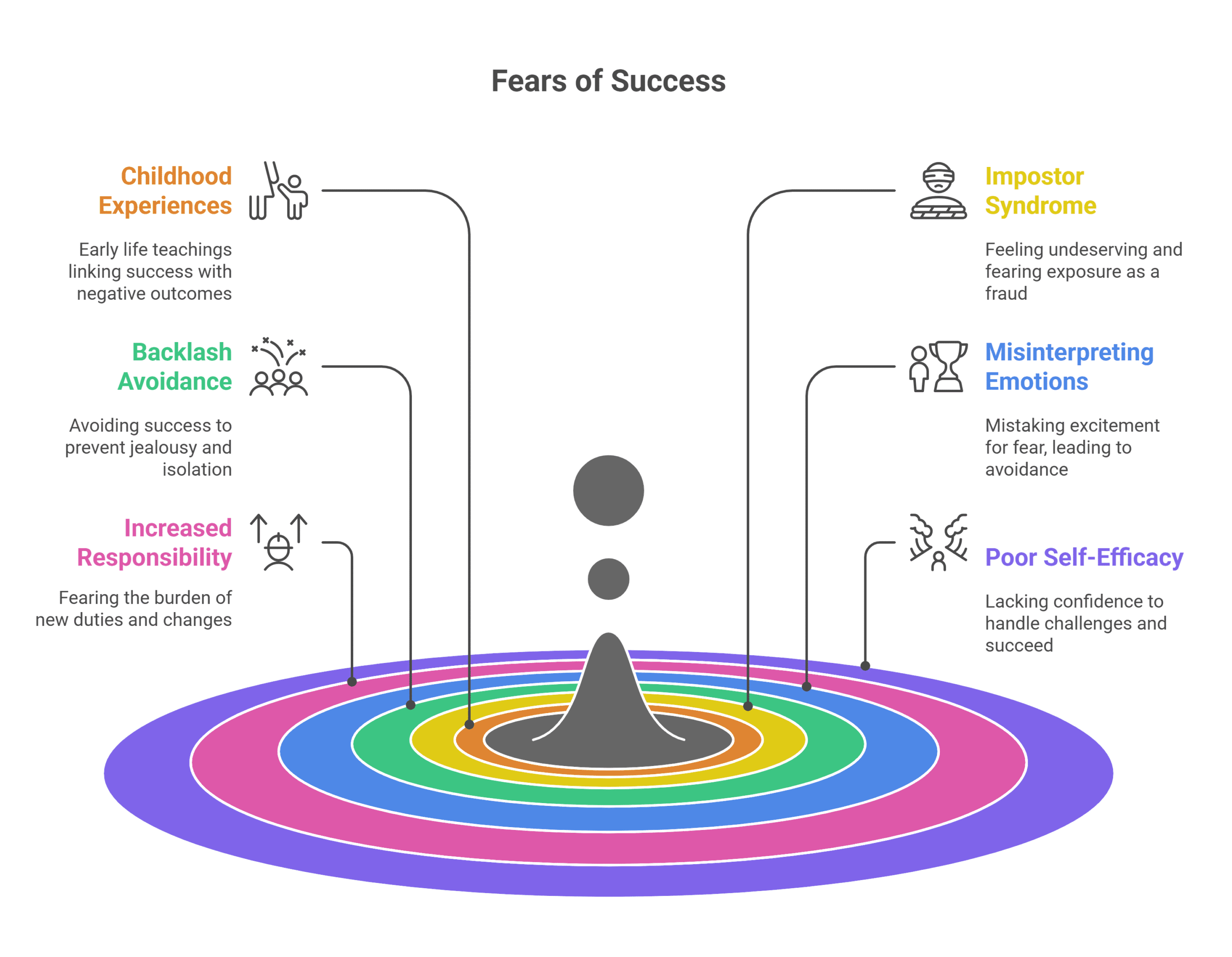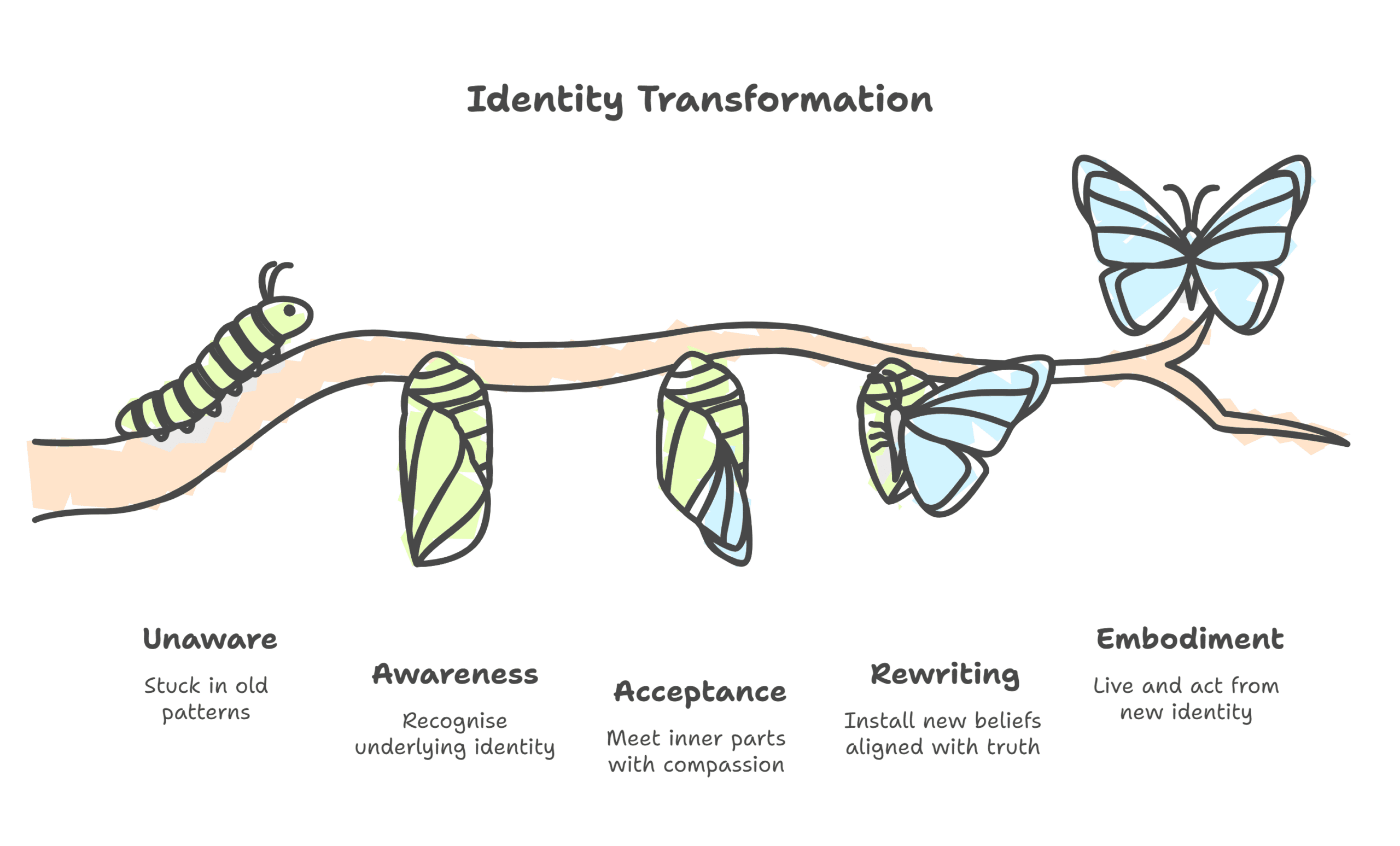Actual scenario: You are a high-achiever with a list of goals. You may have pinned goal quotes to your desk or saved on your phone. Nonetheless, you have to battle with yourself to stay consistent. Do you often think:
“I am inspired but I cannot keep up. What is wrong with me?”
It is more common than you might assume. Achieving goals quotes spark hope but don’t change several people long term. This blog highlights:
- Why you cannot get long lasting motivation from quotes?
- How your subconscious mind influences your inconsistent behaviours?
- What you should do to truly break free from self-sabotage to get lasting consistency?
*clients’ names have been changed due to privacy.
Why Achieving Goals Quotes Feel So Good—But Don’t Create Change
Powerful goals quotes may work like a can of energy drink. It gives you an instant rush. Research shows that motivational content can spike your dopamine levels. It is the same “feel-good” chemical that your body releases when you:
- Get social media likes
- Buy something new
- Hear someone praising you
This dopamine surge creates a temporary burst of energy and optimism.
So Why Don’t You Follow Through?
If you are only trying to make a change in your conscious level, trying to be more discipline, using your willpower, a lot of time, it doesn’t last long.
Because the real gatekeeper of change is your subconscious mind. This is where your core habits, emotional patterns, and protective beliefs are stored. And it doesn’t shift just because you read a quote.
You might consciously want success, but subconsciously still carry beliefs like:
- “If I succeed, I’ll be alone.”
- “If I’m seen, I’ll be criticised.”
- “If I try and fail, I’ll feel worthless.”
That inner conflict is very strong.
And when you try to listen to achieving goals quotes, your subconscious mind will not accept them if they are contradict to your current belief system – how you feel about yourself and success.
Studies show that subconscious goals can affect complex behaviours without conscious awareness.
This means that your conscious mind may cheer on a quote like “You have got this!”. However, your subconscious might want to cling to old limiting beliefs.
For example: Take Shirley, a Brisbane entrepreneur as an example. She filled her vision board with inspiring quotes but couldn’t bring herself to launch her product. Deep down, a younger part of her believed she wasn’t ready… and that success might disconnect her from the people she loved. Until those deeper beliefs are rewired, motivation can’t stick—because the subconscious is still pressing the brakes.
The Real Reasons You Struggle to Stay Consistent
Does your consistency starts to dwindle after a certain period of time? Do you feel de-motivated or “lazy”? There are several reasons for that:
Subconscious Beliefs Sabotaging You
Your subconscious mind is a gatekeeper that stores emotional memories from childhood. That “history” determine how you think of yourself and your capabilities. However, it may directly go against your conscious goals.
Common hidden beliefs that sabotage your goal achievement are:
- “I am not good enough.”
- “I will fail anyway, so why try?”
- “People will expect more from me if I succeed.”
- “I don’t deserve success.”
Research shows that self-efficacy affects motivation and resilience. Your subconscious doubts your success. So, it triggers self-sabotaging behaviours:
- Procrastination
- Avoidance
- Perfectionism
For example: James was a Sydney consultant who searched and shared goals quotes daily. Even then, he delayed milestones of important projects.
Actually, his subconscious believed: “I will be overwhelmed if I succeed.” He was stuck in a “safe” zone of inaction.
Your subconscious may resist even positive changes if it feels it is dangerous. That is why motivation alone isn’t enough to override these beliefs.
Carrying the Voice of Your Critical Parents
Many high-achievers have faced constant criticism and high expectations. They internalise their childhood experience as an inner critic. It is a voice that echoes the judgments of important adults in your life.
You can find out if your inner critic is active with this:
- Second-guess every decision.
- Feel “never good enough” even after achievements.
- Avoid action because you are afraid of making mistakes.
- Harsh self-talk when things don’t go perfectly.
For example: Lisa was overwhelmed with long-term self-doubt even though she was professionally successful. Her inner critical voice sounded like her parents’ high expectations.
The right therapy helped her soften that inner voice. Over time, it transformed into a compassionate inner coach—one that encouraged rather than criticised. This shift became the foundation for her growing confidence and consistent action.
Research confirms that early emotional experiences shape how we treat ourselves as adults. These internalised voices often belong to our inner child—the part of us that absorbed criticism, fear, or rejection early in life. Healing this part is not just helpful—it’s essential for sustainable change.
The Emotional Cost of Perfectionism
Perfectionism is often misunderstood as ambition, but it’s usually fear wearing a mask. A study found that perfectionism is tied to self-worth.
This mindset creates a paralysing cycle:
- Set impossibly high standards.
- Feel overwhelmed and anxious.
- Procrastinate to avoid failure.
- Self-criticise for lack of progress.
For example: Emma was a Brisbane nurse. She was stuck obsessing over perfect presentations. This delayed her career growth. The right approach helped her see perfectionism as fear of judgment instead of excellence.
Fear of Success (Yes, Really)
It is more common than you might assume. A study shows that high-performers fear success because they are worried about increased visibility or criticism.
For example: Mark was a Sydney business owner. He loved goals quotes but couldn’t go through expanding his business.
His subconscious fear was that success means more scrutiny and pressure. Treatment helped him address these feelings. After that, he confidently launched his new program.
Your brain prioritises safety over success. Your subconscious will find ways to keep you “safely” stuck if success feels unsafe.
What Is Fear of Success?
It is also called success anxiety. This fear is an internal argument. You want to succeed but dread the “consequences” it might bring.
Actually, it is not fear of failure but fear of the change and responsibility that come with success. This fear may show up through:
- Procrastination
- Self-sabotage
- Reluctance to pursue opportunities
It can limit your personal and professional growth.
Why Do People Fear Success?
Research and clinical observations show multiple causes for this fear. Several factors are related to early life experiences that societal and emotional pressures:
- Childhood Experiences: You may have been taught to link success with jealousy, punishment, or withdrawal of love in childhood. This can build neural pathways where your subconscious fears being successful.
- Impostor Syndrome: It is a constant thought that you don’t deserve your accomplishments. You may think that people will “find you out” as a fraud. This fear of exposure can make you anxious about living up to your or others’ expectations.
- Backlash Avoidance: You may fear you will become unlikable if you surpass colleagues. You may worry about jealousy or isolation if you live in close-knit communities. This backlash avoidance makes you reject opportunities that can stunt your personal growth.
- Misinterpreting Emotional Responses: Your brain can misinterpret excitement about success as fear. This can trigger you avoiding success to stop feeling uncomfortable. So, you may want to win but feel too overwhelmed to work for it.
- Fear of Increased Responsibility and Change: Success can mean greater responsibilities and changed personal relationships. You may feel you are not able to manage new pressures that come with it.
- Poor Self-Efficacy: You fear to “go big” if you don’t believe in your ability to handle challenges to succeed. This can increase your fears related about achievement and change.

Emotional Overwhelm and Mental Fatigue
Chronic stress and overwhelm are silent killers of consistency. A study found that entrepreneurs can get exhausted that depletes willpower.
For example: Our client Rachel loved achieving goals quotes but felt too drained to pursue her side hustle. Hypnotherapy helped regulate her nervous system. As a result, she restored her mental motivation.
Your brain prioritises survival when your nervous system is trapped in fight-or-flight mode. So, your long-term goals may feel impossible.
Why Willpower Isn’t the Answer?
You might believe that more willpower is the key to staying consistent. But the truth is—willpower is short-term. It drains quickly under stress, fatigue, or emotional overwhelm.
A study confirms that relying on motivation and self-control alone is often unsustainable for lasting change.
The deeper issue lies in your subconscious programming. If your subconscious holds beliefs like:
- “I’m not worthy”
- “Change isn’t safe”
- “It’s better to stay small”
Then no amount of conscious effort can override that inner resistance.
Hypnotherapy helps you realign your subconscious with your conscious goals—so showing up with consistency feels natural, not forced. Change becomes who you are, not something you constantly struggle to maintain.
How to Achieve Goals with Consistency and Drive?
It needs more than motivation. You need to:
- Rewire subconscious patterns.
- Heal internal barriers.
- Build new mental habits that help you stay consistent.
Hypnotherapy can help your transformation. Why? Because it works with your subconscious mind directly.
Here’s how you can build long term consistency with hypnotherapy and conscious strategies:
Heal the Inner Critic and Transform Self-Talk
- Recognise whose voice your self-doubt speaks in. It is an internalised parent or authority figure.
- Use hypnotherapy to change this inner critic into a compassionate coach.
- Replace self-judgment i.e. “You are not good enough” with supportive affirmations i.e. “You are doing your best and that’s enough.”
- This reduces emotional overwhelm so you can build consistency.
Rewire Limiting Beliefs at the Subconscious Level
- Recognise and resolve deep-seated beliefs i.e. “I will fail anyway” or “I don’t deserve success.”
- Create positive beliefs i.e.
- “I am capable.” - “Consistency is safe and rewarding.” - “I deserve success and happiness.” - Strengthen these new beliefs with repeated subconscious reinforcement. It can make consistency feel natural.
Break Free from All-or-Nothing Thinking
- Recognise and challenge “all-or-nothing” mindset. It can make you procrastinate.
- Focus on small baby steps rather than giant leaps (e.g., commit to 10 minutes of work daily rather than an hour-long session).
- Replace harsh self-talk with gentle accountability to become consistent gradually.
Regulate Your Nervous System for Emotional Safety
If you’ve been relying on motivational quotes alone, it’s easy to feel inspired one moment—then overwhelmed or stuck the next. That’s because motivation doesn’t regulate your nervous system. It gives you a mental spark, but not the emotional safety needed to follow through.
To create real, lasting change, your body and mind need to feel calm, clear, and safe. That’s where nervous system regulation comes in.
- Use calming techniques:
- Deep breathing (4-7-8 method) - Progressive muscle relaxation - Grounding exercises (5-4-3-2-1 sensory method) - Also, you can reduce stress with exercise and in-nature-walks. Your mind gets time to unwind and think deeply.
- Hypnotherapy uses calming techniques to restore mental clarity. You don’t only build a consistent routine, you can maintain it long term.
The 4 Steps of Identity Transformation
1. Awareness
Recognise why you are behaving this way. Transformation won’t happen until you find out what is silently driving your:
- Thoughts
- Choices
- Emotional reactions
In addition, analyse your inner dialogue. Try asking:
- “What identity am I living from right now?”
- “Is this the version of me formed from truth—or from old wounds?”
You may find that your behaviour patterns formed because of negative childhood experiences. That’s why you often feel:
- “I am not good enough”
- “I must stay small to be safe.”
Awareness ≠ Blame
Instead, Awareness = Clarity
And Clarity = Power
2. Acceptance
Don’t abhor your old self. Your subconscious will get more confused and perhaps more negative if you don’t feel compassion for your pre-transformation identity.
This is where the healing begins. So, what about:
- The critical voice?
- The self-doubt?
- The procrastination?
They usually come from your inner child. (Yes, it doesn’t “grow old.”) Your younger self may have adapted those behaviours to protect you from:
- Pain
- Rejection
- Failure
However, it doesn’t realise that these behaviours have become out dated because the “dangerous situation” is no longer there. So, your subconscious gets stuck in those patterns. Achieving goal quotes cannot help your mind to break that loop.
The positive aspect of acceptance? You change gradually instead of forcing it at once. You don’t get overwhelmed. You might ask your younger self:
- “What are you afraid of?”
- “What have you been protecting me from?”
You can work with your inner child through:
- Hypnotherapy
- Breathwork
- Parts dialogue
These methods can help you release the subconscious from its outdated roles.
3. Rewriting
You can change truly after accepting your shortcomings. The more you align with yourself, the better you can rewire new beliefs.
Why? Because you may feel safer and more established mentally than before. You don’t feel:
- Overwhelmed
- Exhausted
- Trying to survive
You can choose a new story that reflects who you truly are. You begin to rewrite the inner script:
- From “I am not ready” → “I trust my timing”
- From “I always sabotage” → “I follow through with ease”
- From “I must stay small” → “I allow myself to shine”
This rewiring process happens through subconscious practices like:
- Hypnotherapy
- Mental rehearsal
- Repetition
Your new identity doesn’t remain logical only. You can feel and embody it.
4. Embodiment
Now you can live and act from your new identity.
Embodiment completes your transformation. Finally, people around you can se the positive change in the way you:
- Show up
- Speak
- Decide
- Behave
This step isn’t about perfection—it is about consistency with your new self-concept.
You reinforce your new identity in your brain and nervous system each time you behave positively.
Small aligned choices create the compound effect of real, sustainable change. You no longer just think differently. You become different.

Visualise Success to Strengthen Neural Pathways
Practice vivid mental imagery. You can visualise that you have successfully completed your goals. Engage all your senses to feel that fulfilled feeling. Visualisation:
- Increases confidence
- Reduces fear
- Helps your brain to notice aligned opportunities
Celebrate Tiny Wins to Engage Your Subconscious
Acknowledge and celebrate every small step forward (e.g., showing up for a walk or completing a task). These micro-celebrations create positive feedback loops. So, you can reinforce new habits and maintain motivation over time.
Real Stories of Transformation
Our hypnotherapists at Make It Happen Hypnotherapy (MIHH) help clients replace self-sabotage to consistent progress. They could addressing subconscious blocks through hypnotherapy:
David — The Overwhelmed Business Owner
David spent years using achieving goals quotes but never made real effort to achieve his business goals. The pressure of success made him feel:
- Isolated
- Burdened
- Overwhelmed
So, his subconscious didn’t let him succeed.
Hypnotherapy helped him uncover his subconscious belief that “success means isolation and loneliness.”
David built positive beliefs during his hypnotherapy program. After that, he launched a new program within three months. He maintained consistent marketing efforts confidently.
Anna — The Perfectionist Professional
Anna was stuck in analysis paralysis. She read a lot of goals quotes about persistence but never took action. Fear of criticism paralyzed her mind.
Hypnotherapy helped her find out the root cause of what is really holding her back – fear of judgment and failure in the subconscious level. She shifted this toxic thought pattern completely.
Since then, Anna built consistent daily habits. She also applied for a new job role she had been wanting for years. She had so much more confidence in herself.
Michael — The Procrastinating Creative
Michael had been a procrastinator through most of his life. It had become part of his identity so much that he had accepted himself as:
- Incapable
- Boring
- Lazy
Hypnosis helped him change his self-concept to “someone who takes inspired action.”
This transformation helped him move from abandoning projects in the middle to completing them. Also, he felt accomplished of his achievements.
In a Nutshell
Achieving goals quotes can spark hope, but cannot help you stay motivated consistently. Your subconscious is the part of the mind that stops you from availing opportunities because of fear. You can pursue success with consistency when you change negative beliefs into positive ones with hypnotherapy.
Are you ready to break through self-sabotage to achieve success? Book a free strategy call to discover how.
FAQs
How Can Hypnotherapy Help Me Achieve My Goals?
Hypnotherapy can help you achieve your goals because it links you to your subconscious mind. It stores deeply ingrained habits and beliefs.
Goals quotes may attract your logical conscious mind. However, hypnotherapy helps you recognise and reprogram hidden self-sabotaging thoughts that stop you from staying consistent.
Why Do I Still Procrastinate—Even When I Use Achieving Goals Quotes Often?
Procrastination is your subconscious safety mechanism. It is not always a sign of laziness. It can be a way your mind avoids “danger”. It can be:
- Fear of failure
- Pressure of perfectionism
- Fear of what success might bring i.e. increased scrutiny or responsibility.
You can break the cycle of avoidance when you resolve these hidden dilemmas.
What Is the Difference Between Motivation and Consistency?
Motivation is a temporary emotional state. Achieving goals quotes or praise can trigger it. It gives you a short-term burst of energy but doesn’t last.
On the other hand, consistency is a behaviour-based habit. It happens only when your conscious desires and your subconscious beliefs match. So, you can move towards your goals without needing external prodding.








